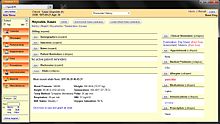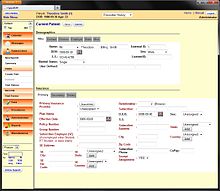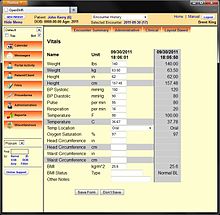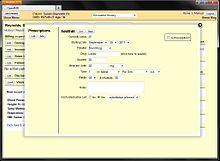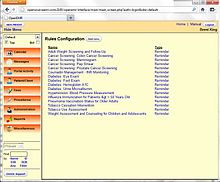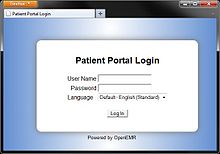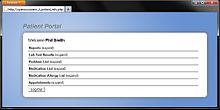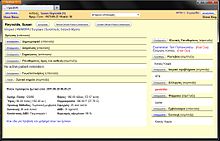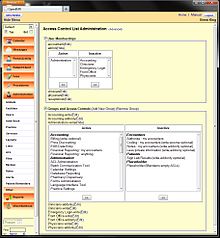- OpenEMR
-
OpenEMR 
Stable release 4.1.0 / September 23, 2011 Operating system Any Unix-like, Mac OS, Windows Platform Cross-platform Type Free and Open Source, Practice management, Electronic Medical Records License GNU General Public License Website OpenEMR web site OpenEMR[1] is a Free and Open Source, Practice management and Electronic Medical Records software application. It is ONC Complete Ambulatory EHR certified[2][3][4] and it features fully integrated electronic medical records, practice management, scheduling, electronic billing, internationalization, free support, a vibrant community, and a whole lot more. It can run on Microsoft systems, Unix-like systems (Linux, UNIX, and BSD systems), Mac OS X and other platforms.
Contents
Features[5]
Free
-
- Open source
- Released under the GNU General Public License
ONC certified
Patient Demographics
-
- Track patient demographics
- Primary information (name, date of birth, sex, identification)
- Marital status
- Contact information of patient and patient's employer
- Primary provider
- HIPAA information
- Language and ethnicity
- Insurance coverage
- Deceased Tracking
- Fully Customizable
- Track patient demographics
Patient Scheduling
-
- Supports multiple facilities
- Patient appointment notification via email and sms
- Compact and flexible appointment calendar
- Calendar features include:
- Find open appointment slots
- Categories for appointment types
- Colors associated with appointment types and facility
- Repeating appointments
- Restricting appointments based on type
Electronic Medical Records
-
- Encounters
- Medical Issues
- Medications
- Immunizations
- Forms and clinical notes:
- Vitals (growth charts included)
- SOAP note
- Review of systems
- Template Driven Forms
- CAMOS (Computer Aided Medical Ordering System)
- Nation Notes (WYSIWYG editor)
- Ability to create and customize forms
- Graphical Charting
- Labs
- Procedures
- Patient Reports
- Referrals
- Patient Notes
- Disclosures
- Electronic digital document management
- Voice recognition ready (MS Windows Operating Systems)
- Paper chart tracking
- Electronic Syndrome Surveillance reporting
Prescriptions
-
- Online drug search
- Track patient prescriptions and medications
- Create and send prescriptions
- E-Prescribe
- Fax
- In-house pharmacy dispensary support
Medical Billing
-
- Flexible system of coding including CPT, HCPCS and ICD codes and the ability to add others
- Support for electronic billing to clearing houses such as Medavant/Capario and ZirMED using ANSI X12
- Support for paper claims
- Medical claim management interface
- Insurance Eligibility Queries
- Insurance Tracking Interface
- Accounts Receivable Interface
- EOB Entry Interface
- Customizable to work with a clearing house for automated 835 or ERA entry
Clinical Decision Rules
-
- Physician Reminders
- Patient Reminders
- Clinical Quality Measure Calculations
- Automated Meaningful Use Measurement Calculations
- Fully Customizable and Flexible
Patient Portal
-
- Reports
- Labs
- Medical Problems
- Medications
- Allergies
Multilanguage Support
-
- Supports use of multiple languages within the same clinic
- Currently Supported Languages:[6]
- Any language can be added and translated in a collaborative Google Docs spreadsheet maintained by the OpenEMR community[7]
- Fully supports UTF-8 encoding
Security
-
- Ability to Encrypt Patient Documents
- Supports fine-grained per-user access controls
- Remotely accessible from any modern web browser with a suitable security certificate installed
Support
History
OpenEMR was originally developed by Synitech and version 1.0 was released in June 2001 as MP Pro (MedicalPractice Professional). Much of the code was then reworked for HIPAA compliance and improved security, and the product was reintroduced as OpenEMR version 1.3 a year later, in July 2002.[10] It became an open source project and was registered on SourceForge.net on August 13, 2002.
The project evolved through version 2.0 and the Pennington Firm (Pennfirm) took over as its primary maintainer in January 2004.
Pennfirm made the medical community more aware of OpenEMR, and attracted a number of independent developers who became increasingly active in making improvements. Walt Pennington transferred the OpenEMR software repository to SourceForge in March 2005, where it remains today. Mr. Pennington also established Rod Roark, Andres Paglayan and James Perry, Jr. as administrators of the project. Andres Paglayan and James Perry eventually took other directions and were replaced by Brady Miller in August of 2009. So at this time Rod Roark and Brady Miller are the project's co-administrators.[11]
Community
The OpenEMR community is dedicated to guarding OpenEMR's status as a free, open source software solution for medical practices. Its members are composed of software developers, as well as physicians and others with extensive medical and billing knowledge, all with the common goal of making OpenEMR a superior alternative to its proprietary counterparts.
Following are some of the guiding principles that have been formulated by the project's most active members:
- OpenEMR will remain 100% free software under the GNU GPL.
- Maintain a spirit of openness, kindness and cooperation.
- Give back to the free software community.
- Document our changes and improvements.
- Do not hide problems.
- Do not discriminate against persons or groups, subject to our focus on the field of medicine and we encourage the use of OpenEMR in other languages.
- Avoid needless complexity, to include software design, installation, maintenance and usability.
The OpenEMR community is thriving and enjoying some of the broadest user support and developer support. OpenEMR is one of the most popular free electronic medical records in use today with over 3,700 downloads per month.[12] The development group has professional developers, security specialists, and physicians involved in the development process. The community maintains the official OpenEMR web site at open-emr.org.[13][14][15][16][17][18][19][20][4]
Deployments
Because this is an open source project that does not register its users, it is very difficult to estimate the number of practitioners that are using this software. A survey of commercial supporters[21] of this software in the US show at least 100 clinical facilities (with an average of 5 practitioners per facility) are using this software with commercial help. There are also articles describing single clinician deployments[22][23][24] and a free clinic deployment.[25] Internationally, it is known that there are practitioners in Pakistan,[26] Puerto Rico, Australia, Sweden, Holland, Israel, India,[27] Malaysia, Nepal, Indonesia, Bermuda, Armenia, Kenya, and Greece that are either testing or actively using OpenEMR for use as a free electronic medical records program.
Architecture
OpenEMR is a "LAMP" type of web based software application that uses a web server such as Apache, MySQL as the database and PHP as its programming language. As with most "LAMP" architecture, OpenEMR can run on Linux, Unix, BSD, Mac OS X, and Microsoft architectures.
Certification
OpenEMR version 4.1 was released on 9/23/2011, which has ONC Complete Ambulatory EHR Certification.[2][3][4]
Supporting Organizations
OEMR is a non-profit 501(c)(3) organization that supports the OpenEMR project and accepts donations that will go towards the betterment of the OpenEMR project.[28]
References
- ^ "OpenEMR Project Website". http://www.open-emr.org/. Retrieved 2011-10-01.
- ^ a b c "ONC Complete Ambulatory EHR Certified". http://onc-chpl.force.com/ehrcert/EHRProductDetail?id=a0X30000003mNwTEAU&retURL=%2Fehrcert%2FEHRProductSearch&setting=Ambulatory. Retrieved 2011-09-23.
- ^ a b c Maduro, Roger (2011-08-22). "OpenEMR 4.1 Achieves Full 'Meaningful Use' Certification". http://openhealthnews.com/hotnews/openemr-41-achieves-full-meaningful-use-certification. Retrieved 2011-10-01.
- ^ a b c d Cahn, Jack (2011-08-20). "OpenEMR achieves full ONC certification". http://linuxmednews.com/1313842854/index_html. Retrieved 2011-10-01.
- ^ "OpenEMR Features". http://www.open-emr.org/wiki/index.php/OpenEMR_Features. Retrieved 2011-10-11.
- ^ "OpenEMR Translation Database Statistics". http://www.open-emr.org/wiki/index.php/Internationalization_Project_Status. Retrieved 2011-09-29.
- ^ "OpenEMR Internationalization Project". http://www.open-emr.org/wiki/index.php/OpenEMR_Internationalization_Development. Retrieved 2009-11-25.
- ^ "Free OpenEMR Support at Sourceforge". http://sourceforge.net/projects/openemr/support. Retrieved 2009-11-25.
- ^ "OpenEMR Official Wiki". http://www.open-emr.org/wiki. Retrieved 2011-09-29.
- ^ Stack, Matthew (2002-07-05). "OpenEMR Released". http://linuxmednews.com/linuxmednews/1025910430/index_html. Retrieved 2009-11-26.
- ^ "Sourceforge OpenEMR Project". http://sourceforge.net/projects/openemr/. Retrieved 2011-10-01.
- ^ "OpenEMR Sourceforge Download Statistics". http://sourceforge.net/project/stats/detail.php?group_id=60081&ugn=openemr&type=prdownload&mode=12months&file_id=0. Retrieved 2010-02-23.
- ^ "OpenEMR on Sourceforge". http://sourceforge.net/projects/openemr/. Retrieved 2011-08-19.
- ^ "OpenEMR on Github". http://github.com/openemr/openemr. Retrieved 2011-08-19.
- ^ "OpenEMR on Google Code". http://code.google.com/p/openemr. Retrieved 2011-08-19.
- ^ "OpenEMR on Gitorious". http://gitorious.org/~openemr. Retrieved 2011-08-19.
- ^ "OpenEMR on repo.or.cz". http://repo.or.cz/w/openemr.git. Retrieved 2011-08-19.
- ^ "OpenEMR on bitbucket". http://bitbucket.org/openemr/openemr. Retrieved 2011-11-11.
- ^ "OpenEMR on Assembla". http://www.assembla.com/spaces/openemr. Retrieved 2011-11-11.
- ^ "OpenEMR on Launchpad". http://launchpad.net/openemr. Retrieved 2011-11-12.
- ^ "OpenEMR Commercial Help". http://www.open-emr.org/wiki/index.php/OpenEMR_Commercial_Help. Retrieved 2011-09-29.
- ^ Holzer, Joe (2009-11-25). "OpenEMR Success Story". http://www.emrandhipaa.com/emr-and-hipaa/2009/11/25/openemr-success-story/. Retrieved 2009-12-14.
- ^ Leeds, Mark (2006-01-29). "Using OpenEMR in Family Practice". http://linuxmednews.com/1138557562/index_html. Retrieved 2009-12-14.
- ^ Bowen, Samuel. "OpenEMR Case Study". http://www.ehrlive.com/docs/bowen_cs.pdf. Retrieved 2009-12-14.
- ^ Clifford, Kevin (2009-11-15). "Guest Article: Open Source EMRs for free clinics". http://www.healthcareguy.com/2009/11/15/guest-article-open-source-emrs-for-free-clinics/. Retrieved 2009-12-14.
- ^ Mushtaq, Hina (2010-01-18). "Jaroka Electronic Health Record System provides opportunities for further Research and Analysis". http://blogs.tele-healthcare.org/2010/01/jaroka-electronic-health-record-system.html. Retrieved 2010-01-23.
- ^ DIMAPUR (2010-04-05). "FPAI conducts training on OpenEMR". http://nagalandpost.com/ShowStory.aspx?npoststoryiden=UzEwMjQyOTE%3D-u5jpoTKCit0%3D. Retrieved 2010-04-05.
- ^ "Organizations Supporting OpenEMR". http://open-emr.org/wiki/index.php/OpenEMR_Wiki_Home_Page#Organizations_Supporting_OpenEMR. Retrieved 2011-11-06.
- Wallen, Jack (2011-10-11). "DIY: OpenEMR, free software for medical practices". Retrieved 2011-10-11.
- AG (2010-02-12). "OpenEMR - At a glance". Retrieved 2010-02-16.
- Lewis, Hans (2010-01-18). "Electronic Medical and Health Records Usage Increases in U.S.: Report". Retrieved 2010-01-23.
- Shah, Shahid (2007-01-07). "Open Source EMR and Practice Management Software Appliance". Retrieved 2009-12-07.
- Bowen, Samuel; Hoyt, Robert; Glenn, Ladeana; McCormick, Donald; Gonzalez, Xavier (2009). "Open Source Electronic Health Records: in Practice". Retrieved 2011-09-30.
- Bowen, Samuel; Valdes, Ignacio; Hoyt, Robert; Glenn, Ladeana; McCormick, Donald; Gonzalez, Xavier (2009). "Open Source Electronic Health Records: In Public Policy". Retrieved 2011-09-30.
- Weatherby, Julia (2006-02-16). "Technical Aspects of OpenEMR". Retrieved 2011-09-30.
- Simbini, T. (2006-02-16). "OpenEMR Architecture". Retrieved 2011-09-30.
- Donahue, Margaret (2006-02-16). "The OpenEMR Community". Retrieved 2011-09-30.
External links
Categories:- Health software
- Medical informatics
- Health informatics
- Open source health care resources
- Linux science software
-
Wikimedia Foundation. 2010.


